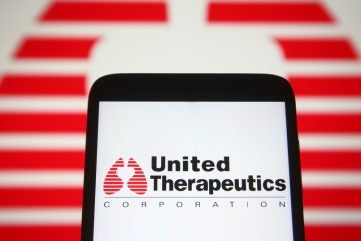
United Therapeutics has sued the US Food and Drug Administration (FDA), claiming the agency did not follow rules when approving a change to rival Liquidia’s new drug application (NDA).
The US biotech accused the agency of permitting Liquidia to “skirt longstanding FDA rules, precedents, and procedures on how pending drug approval applications are handled”, according to a 21 February press release.
Commencing litigation is yet another chapter in the long saga between United and federal agencies, centred on the company’s ageing pulmonary arterial hypertension drug Tyvaso (treprostinil). Tyvaso is indicated for pulmonary arterial hypertension (PAH), for which it was approved in 2009, and pulmonary hypertension associated with interstitial lung disease (PH-ILD), as per its drug label.
Tyvaso has entered blockbuster territory, seeing global sales of $1.2bn in 2023, up 41% from 2022 sales. A dry powder inhaler (DPI) formulation, approved for both indications in May 2022, accounted for nearly two-thirds of these 2023 sales.
It is estimated to make United $2.7bn by 2029, according to GlobalData’s Pharma Intelligence Centre.
See Also:
GlobalData is the parent company of Pharmaceutical Technology.
How well do you really know your competitors?
Access the most comprehensive Company Profiles on the market, powered by GlobalData. Save hours of research. Gain competitive edge.

Thank you!
Your download email will arrive shortly
Not ready to buy yet? Download a free sample
We are confident about the unique quality of our Company Profiles. However, we want you to make the most beneficial decision for your business, so we offer a free sample that you can download by submitting the below form
By GlobalDataUnited’s original patent, which would have granted protection until May 2027, was declared invalid and cancelled by the Patent Trial and Appeal Board (PTAB) in 2022. A year later, United attempted to revive the patent, but a US appeals court upheld the earlier decision, opening the regulatory door for Liquidia’s version of trepostinil, Yutrepia, to enter the market.
Liquidia’s drug, also a DPI, was granted tentative approval by the FDA for the treatment of PAH in 2021 – a type of clearance used when patent or exclusivity issues are ongoing.
Feathers were ruffled when Liquidia amended its NDA to include PH-ILD as an indication. The FDA delayed the Prescription Drug User Fee Act (PDUFA) date for the drug after the change to the application, with no timeline currently set.
United now calls Liquidia’s NDA amendment “unlawful”, stating that a new NDA is needed for the PH-ILD inclusion. Currently, there is only one patent left in the infringement battle.
United Therapeutics’ global regulatory affairs executive vice-president Dean Bunce said legal and regulatory precedents are sometimes missed.
Bunce said: “We are simply asking that the FDA apply its own rules and precedents consistently to honour the Hatch-Waxman balance struck by Congress between innovators and imitators: Liquidia can rely on United Therapeutics’ innovation to speed its path to market, but the cost of that shortcut is that Liquidia must address the infringement claim against it before rushing to market.”
United highlighted that Liquidia avoided a 30-month window in which the FDA cannot approve an NDA amidst patient infringement, as per the Hatch-Waxman Act. The 30-month delay in Liquidia’s PH-ILD indication approval could be enacted if United were successful in its litigation.
In a January 2024 statement relating to the NDA amendment, Liquidia said: “The sole remaining patent […] was not issued before Liquidia submitted the NDA for Yutrepia in January 2020 to treat PAH.
“Therefore, the Company believes that final FDA approval for Yutrepia will not be subject to any statutory 30-month stay arising from the New Hatch-Waxman Litigation per Section 505(c)(3)(C) of the Federal Food, Drug and Cosmetic Act.”



